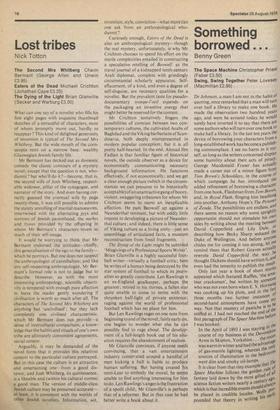Lost tribes
Nick Totton
The Second Mrs Whitberg Chaim Bermant (George Allen and Unwin £3 95) Eaters of the Dead Michael Crichton (Jonathan Cape £3.25) The Dying of the Light Brian Glanville (Secker and Warburg £3.50) What can one say of a novelist who fills his first eight pages with exquisite thumbnail sketches of a terraceful of characters, most of whom promptly move out, hardly to reappear? This kind of delighted generosity of invention is typical of The Second Mrs Whitherg. But the wide mouth of the cornucopia rests on a narrow base: wealthy Glaswegian Jewish family life.
Mr Bermant has decked out as domestic comedy the classic contours of a mystery novel; except that the question is not, whodunnit? but who'll do it ?— become, that is, the second wife of Josh Whitberg, respectable widower, pillar of the synagogue, and narrator of the story. And even having correctly guessed the eventual wife by page twenty-three, it was still possible to admire the stately unrolling of marital manoeuvres, intertwined with the alternating joys and sorrows of Jewish parenthood, the naches and tzores pro‘ided by the offspring in whom Mr Bermant's characters invest so much of their self-image.
It would be worrying to think that Mr Bermant endorsed the attitudes—chiefly, this generalisation of the ego to the family— which he portrays. But one does not suspect the anthropologist of cannibalism; and like any self-respecting anthropologist. Mr Bermant's formal role is not to judge but to describe. However, as with the most interesting anthropology, scientific objectivity is tempered with enough pure affection to leave the reader gently wondering if civilisation is worth so much after all. The characters of The Second Mrs Whitherg are anything but 'uncivilised': but they lack completely one civilised characteristic, which Mr Bermant does not provide—a sense of intercultural comparison, a knowledge that the habits and rituals of one's own tribe are ultimately convenient agreements, social cement.
Arguably, it may be demanded of the novel form that it provides this relativist context to the particular culture portrayed. But in this case the culture is an attractive and entertaining one—from a good distance; and Josh Whitberg, its quintessence, is a likeable and (within his cultural norms) a good man. The version of middle-class Jewish culture may be presumed accurate— at least, it is consistent with the worlds of other Jewish novelists. Information, wit, invention, style, conviction—what more can one ask from an anthropological whodunnit?
Curiously enough, Eaters of the Dead is also an anthropological mystery—though the real mystery, unfortunately, is why Mr Crichton chooses to spend his effort on the sterile complexities entailed in constructing a speculative retelling of Beowulf as the travel journal of a kidnapped tenth century Arab diplomat, complete with grindingly circumstantial scholarly apparatus. Selfeffacement, of a kind, and even a degree of self-disguise, are necessary qualities for a novelist. But the prevalent taste for pseudodocumentary trompe-l'oeil expends on the packaging an inventive energy that might better be reserved for the content.
Mr Crichton tentatively fingers the possibilities of contrast between two contemporary cultures, the cultivated Arabs of Baghdad and the Viking barbarians of Scandinavia, both deeply misrepresented in modern popular conception; but it is all pretty half-hearted. In the end. Ahmad 1bn Fadlan is that familiar figure of historical novels, the outside observer as a device for economically communicating necessary background information. He functions effectively, if not economically; and we get a clear enough picture (which in the circumstances we can presume to be historically acceptable) of an unattractive gang of boozy, violent, swaggering tribesmen for whom Mr Crichton seems to nurse an inexplicable affection. He puts Beowulf up against a Neanderthal remnant, but with oddly little interest in developing a picture of Neanderthal culture; and indeed, there is little sense of Viking culture as a living unity--just an assemblage of articulated facts, a museum reconstruction from fossil fragments.
The Dying of the Light might be subtitled 'M isgivings of a Professional Sports Writer'. Brian Glanville is a highly successful football writer—virtually a football critic; here he writes of a human being destroyed by the star system of football to which its jburnalists so greatly contribute. Len Rawlings is an ex-England goalkeeper, perhaps the greatest; retired in his thirties, a fallen star quite unable to come to terms with the shrunken half-light of private existence; raging against the world of professional football which has no place for him.
But Len Rawlings rages on one notc from beginning to end of the novel: fairly early on, one begins to wonder what else he can possibly find to rage about. The development of a full-length book out of his situation requires the abandonment of realism.
Mr Glanville convinces, if anyone needs convincing, that a vast entertainment industry constrixted around a handful of men kicking a ball is liable to produce human suffering. But having created his mini-Lear to embody the moral, he seems unable to find anything interesting for him to do. Len Rawlings's anger is the frustration of a spoilt child; Mr Glanville's is perhaps that of a reformer. But in that case he had better write a book about it.


























 Previous page
Previous page